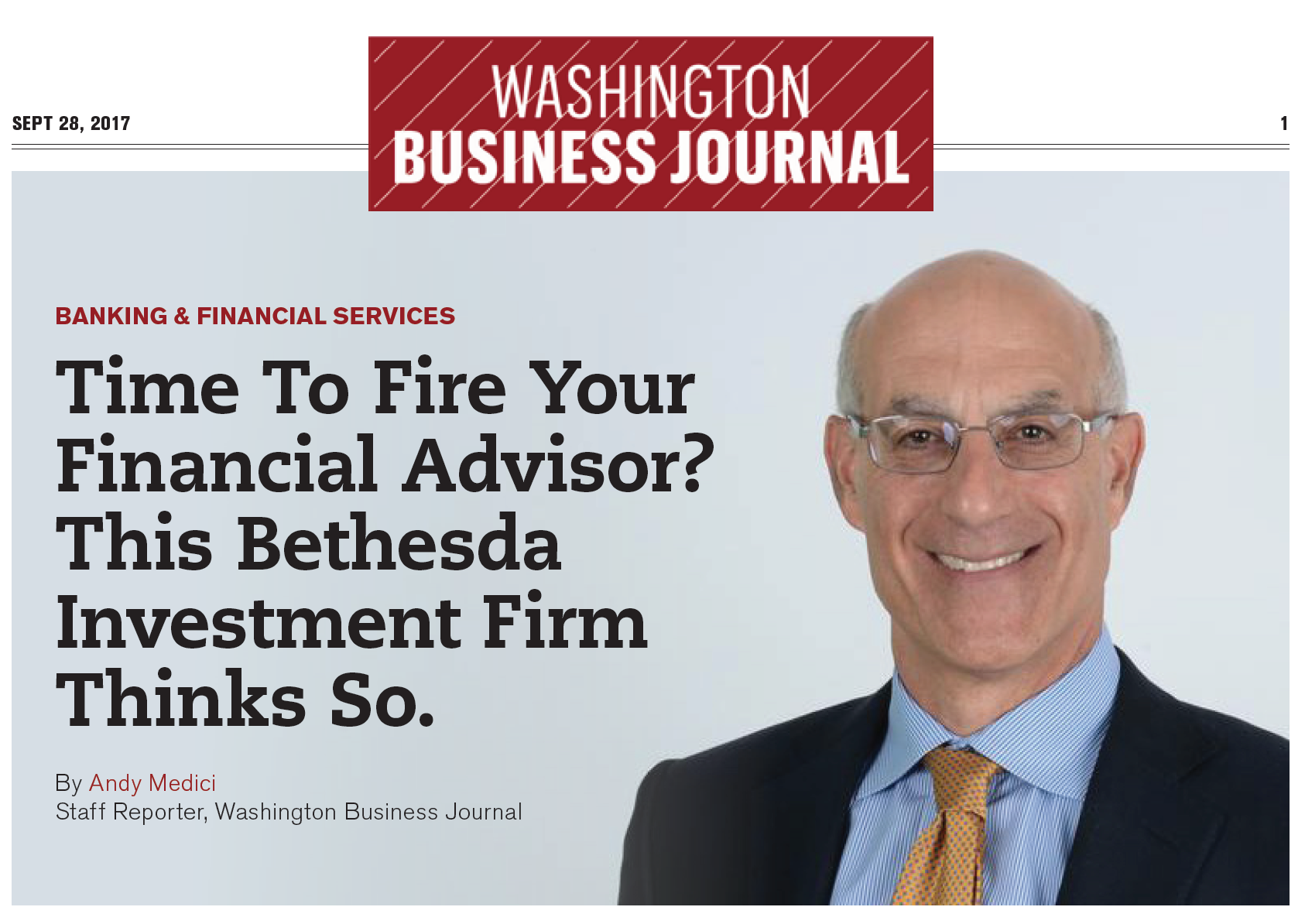
BANKING & FINANCIAL SERVICES
Time To Fire Your Financial Advisor? This Bethesda Investment Firm Thinks So.
By Andy Medici Staff Reporter, Washington Business Journal
Scott Puritz thinks you might need to fire your financial advisor.
As the Managing Director of Bethesda-based Rebalance, his motives are at least partly selfish. He believes a lot of people would benefit from what he said are the lower fees charged by his company.
But he also sees the long-entrenched relationships with financial advisers, and the fees they charge, as one of the less acknowledged problems facing many wealthier Americans — that the person they have trusted for years to help them invest may be charging them far more than they realize.
“It’s about overcoming the inertia,” Puritz said, adding that many people have used the same adviser for years, or even inherited them from family members. “Telling someone you might have placed your trust in the wrong person — they don’t believe it.”
He says comparing brokerage statements usually reveals how much they are paying in fees, and that is Rebalance’s best pitch to a potential customer.
Here’s how it works: Rebalance uses what is called “portfolio indexing,” which is a type of mutual fund with stocks chosen by the firm to match that of a market index, like Standard & Poor’s 500. The idea is that indexing, over time, beats the performance of more actively managed funds while operating at lower costs. Rebalance also pairs clients with an investment adviser and a customer service representative for that added personal touch.
So far Rebalance has kept its fees to less than half of 1 percent, compared to wealth managers who charge anywhere from 1 to 2 percent in fees. Rebalance’s diversified growth portfolio has just 0.012 percent fees, which means someone who invest $100,000 into it only pays $120.
Since its founding in 2013, the company has grown to 21 employees with a second office in Silicon Valley, and about $2 million in revenue.
Puritz said while it took about four and a half years for Rebalance to reach $500 million in assets, he thinks it will only take another two and a half years to reach $1 billion.
“We have been growing at about 30 percent a year,” Puritz said. “But we feel like we are just getting warmed up.”
Puritz is no stranger to the spotlight either. He has been interviewed by NPR and testified in front of the Senate in support of what was called “the fiduciary rule,” which would have put stricter conflict-of-interest standards in place by financial and wealth advisers. In that testimony he said that 30 percent of the company’s client base comes to Rebalance after a bad experience with their previous brokerage firm, what he called “brokerage refugees.”
Before Rebalance, Puritz founded a number of tech companies, including OptiGlobe and Diveo. Rebalance’s chief investment officer is Mitch Tuchman, a seasoned investment professional who founded “do-it-yourself” online investment service MarketRiders and was a hedge fund subadviser for ApexCapital.
But Rebalance is not alone in its quest for low fees. It is also part of a much larger, industry-wide trend away from high fee-based investment advice, according to ICI Research, which analyzes investment firm data. Expense ratios for mutual funds, which include fees, are coming down across the board, from about 1.04 percent in 1996 to 0.63 percent in 2016. Fees tend to vary by region as well.
While convincing customers to part ways with their previous advisors is one of the top challenges facing Rebalance, another might be finding ways to break through what sometimes is a massive wave of advertising from other wealth advisors and financial firms.
That makes it hard to reach potential customers, so Puritz said the company is working on creating channel partners who could in turn offer Rebalance to their own clients or customers.
“People spend more time thinking about where they should change the oil in their car than the optimal way to invest their retirement assets,” Puritz said. “Whether it’s embarrassment or fear or some negative feeling of incompetence, they are intimidated by the topic.” •


